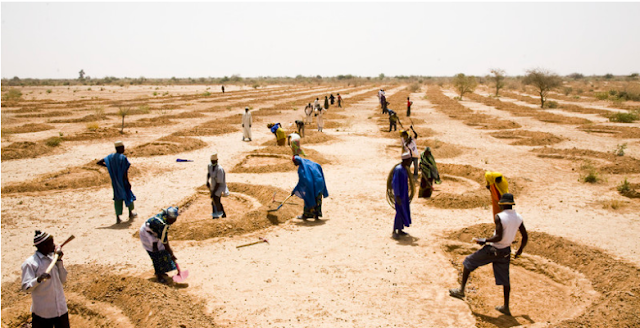Success in Virtual Water
Coming to my last
post, exploring the current links between water and food in the African
continent. Food production is the largest societal
water consumption and It is easy to be oblivious to the gallons of water
used in the production of making everyday goods. Exploring innovative
technologies as well as agricultural water harvesting techniques has been a
positive, eye opening experience.
I have left the
concept of virtual water till last as I believe it is a very plausible solution
that is easily applicable to many countries. It could possibly become one of
the most important trades in years to come. Import rather than export water
rich foods is the key.
What is virtual water:
Virtual water is the
volume of water 'embedded' in agricultural
goods, the global trade of these products can save the host country
water resources, as they are expelling less water for irrigation purposes. The
exports of water intensive crops can ease stress a country's limited resources
and assist a country's water demand management. The concept of virtual water
has been alive for many thousands of years, specifically between cattle
herders in the Sahel region, but has been modernised in light of
globalisation and the ability to trade worldwide with water rich countries.
Virtual water
appeared to me to be a particularly useful solution for countries with
trans-boundary hydro political conflicts surrounding strained resources,
shifting the usage of water to water rich countries freeing water for
consumption and small scale irrigation. Water rich countries, are however
currently importing goods from drought-prone countries to sustain the needs of
their populations. The importing should be reversed to ensure a global balance
of water.
Concept of virtual water in Egypt:
Egypt lies within
the East Nile river basin, along with Sudan and Ethiopia. Egypt is a very arid
country, with average rainfall rarely exceeding 200mm per annum (mostly falling
in coastal areas). Due to unreliable precipitation patterns, irrigation must be
relied on for agriculture. Egypt relies
on the River Nile as its main water source. 85%
of the country's water use is used for irrigation purposes. Due to high levels
of international trade, Egypt is a virtual water trader. The net virtual water
import as a percentage
of water resources is roughly 20%.
Egypt has an advantage to the other countries in the
East Nile river basin in the production of high-value
crops for export, mostly to European and middle Eastern, markets. The
import of food and fodder crops have contributed to Egypt's food
security. Although food imports have increased, levels of domestic food
production have also risen, this may be due to retain farmers livelihoods and
reducing poverty.
Does virtual water trade provide a solution to water
scarcity?
The potential to
save water both nationally and internationally is substantial, however it would
be misleading to think of it as the primary solution to water conservation. A
disadvantage to virtual water trade is an increased dependency on other countries
to provide food for another country, which leaves food and water security in
the hands of possible complications, such as political and environmental
issues.
Personally, I
believe virtual water to be a very realistic solution to water scarcity.
However, many articles express negativity towards countries, specifically
within Africa increasing rates of food imports.
Reading through my
peer's blog
post on virtual water, a point was made about the viability of virtual
water as an option for poorer countries, and whether they can afford to
outsource food produce. Instead they suggest focusing on becoming self
sufficient and focusing on agriculture that adapts to rainfall patterns.
The reduction in
land being used for intensive farming gives time for fallow periods to
regenerating the soil nutrients. This will also allow for better infiltration
capacities of the soil, loosing less water to run-off. Higher crops yields have
also been observed after fallow periods, for example research in Zimbabwe
proved this to be the case after a maintained fallow
period.
In light of this,
farmers who may have been in the industry for years, even generation will have
a loss of livelihood, with a niche skill set that is not easily transferable to
another industry. Furthermore, looking at the Sahel, however leaving soil bare
will expose it to soil erosion enhancing desertification in the arid region.


Comments
Post a Comment